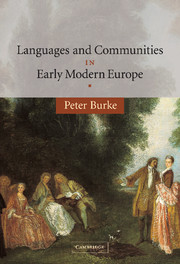Book contents
- Frontmatter
- Contents
- Acknowledgements
- Chronology 1450–1794
- Prologue: communities and domains
- 1 ‘Speak, that I may see thee’: the discovery of language in early modern Europe
- 2 Latin: a language in search of a community
- 3 Vernaculars in competition
- 4 Standardizing languages
- 5 Mixing languages
- 6 Purifying languages
- Epilogue: languages and nations
- Appendix: languages in Europe 1450–1789
- Bibliography
- Index
1 - ‘Speak, that I may see thee’: the discovery of language in early modern Europe
Published online by Cambridge University Press: 07 December 2009
- Frontmatter
- Contents
- Acknowledgements
- Chronology 1450–1794
- Prologue: communities and domains
- 1 ‘Speak, that I may see thee’: the discovery of language in early modern Europe
- 2 Latin: a language in search of a community
- 3 Vernaculars in competition
- 4 Standardizing languages
- 5 Mixing languages
- 6 Purifying languages
- Epilogue: languages and nations
- Appendix: languages in Europe 1450–1789
- Bibliography
- Index
Summary
In the prologue, the point of view expressed was that of scholars today, whether linguists or historians. Language was a topic on which a number of early modern Europeans also expressed their opinions, sometimes forcefully. A study of languages and communities cannot afford to neglect such opinions. The following account is not intended as a history of linguistics, emphasizing the achievement of individual scholars, but rather as a map of attitudes to language, or changes in attitude, as revealed in commonplaces, or in ideas that gradually became commonplace at this time. Indeed, we might describe the early modern period as the age of what I shall call the ‘discovery of language’.
THE LATER MIDDLE AGES
The point of this dramatic expression is not to suggest that medieval people were unconcerned with the languages that they were speaking and writing. In thirteenth-century Spain, for example, the standardization of the language associated with King Alfonso the Wise (below, p. 63) implied knowledge of the alternatives to that standard. The fourteenth and fifteenth centuries, in particular, were a time of increasing linguistic awareness, not only in the Italy of the early Renaissance but also in England, France and Central Europe.
In Italy, for instance, Dante contributed to the debate on the vernacular in his De vulgari eloquentia, written around the year 1305.
- Type
- Chapter
- Information
- Languages and Communities in Early Modern Europe , pp. 15 - 42Publisher: Cambridge University PressPrint publication year: 2004
- 1
- Cited by

